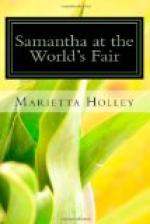I wouldn’t deign to argue with him, only I remarked, “Wall, the team prances, and throws you time and again, Josiah Allen.”
Sez I, “The Japans are neat, industrious, studious, and progressive, ardent in desirin’ knowledge.”
“Wall,” sez he, “if you think so much on ’em, why don’t you buy a pipe—they all smoke, men and wimmen.”
He didn’t love to hear me praisin’ even a nation, that man didn’t, but I soothed him down by drawin’ his attention to the housen of the little village.
They wuz low, and had broad eaves, and a sort of a piazza a-runnin’ all round ’em; they seemed to be kinder plastered on the outside; and the doors and winders—I wouldn’t want to swear to it—but they did seem to be wood frames covered with paper, that would slide back and forth, and the partitions of the housen seemed to be made of paper that could be slipped and slided every way, or be took down and turn the hull house into one room.
And the little gardens round the housen looked curious as a dog, and curiouser, with trees and shrubs dwarfed and trained into forms of animals and so forth.
But I leaned heavy on the thought that my house and garden in Jonesville would look jest as queer to ’em, and got along without bein’ too dumbfoundered. As I wuz a-walkin’ along there I did think of the errant Old Miss Baker sent by me.
She wanted me to git her a japanned dust-pan. She said that “them she bought of tin-peddlers wuzn’t worth a cent—the japan all wore off of ’em.”
“But,” sez she, “you buy it right at headquarters—you’d be apt to git a good one;” and she told me that I might go as high as twenty-five cents if I couldn’t git it for no less.
And I spoke on’t there, but Josiah said “that he wouldn’t go a-luggin’ round dust-pans for nobody to this Fair.”
But I sez, “I guess that Columbus went through more than that.”
But I did in my own mind hate to go round before the nations a-carryin’ a dust-pan—they’re so kinder rakish-lookin’.
But if I’d seen a good one I should have leaned on duty and bought it.
But we didn’t see no signs of any.
But we see pictures and ornaments so queer that I felt my own eyes a-movin’ round sideways a-beholdin’ of ’em, or would have if we had stayed there long enough. We see as we wended along that all round the island wuz another garden all full of flowers, and ornamental grasses, and beautiful shrubs, and windin’ walks, and so forth, and so forth, and so forth—an Eden of beauty.
And in one place we see in a large tank the Victoria Regia. Its leaves wuz ten feet long, and when in the water in its own home, the River Amazon in Brazil, the leaves will hold up a child six years old.
Then there wuz the lotus from Egypt, and Indian lilies, and that magnificent flower, Humboldt’s last discovery, “the water poppy.”
It wuz a sight—a sight.




